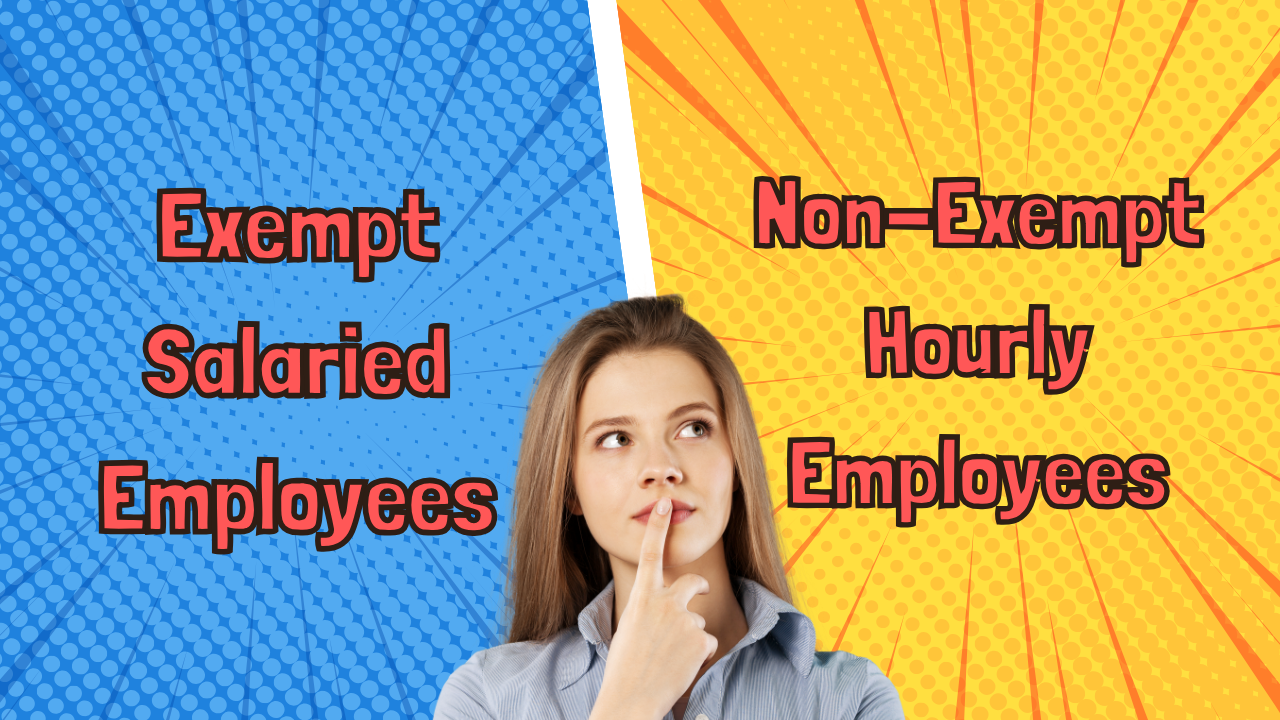Overview: Misclassification of Exempt Employees
In California, employees can be exempt or non-exempt. As per the DIR (Department of Industrial Relations), the main difference between the two classifications revolves around federal and state labor laws specifically (overtime, meal, and rest breaks). To understand misclassification of exempt employees in California, it’s important to first understand who exempt & non-exempt employees are.
As the name suggests, exempt employees are exempt from federal and state labor laws, while non-exempt employees are subject to the laws.
Who is an Exempt Employee in California?
Generally, employees that qualify as independent contractors, outside salespersons, employees in some computer-related fields, executives, administrative employees, and professional employees are exempt/not subjected to laws on meal breaks, rest breaks, and overtime.
However, an employee’s job title alone doesn’t dictate their exemption status. For example, you can have an executive or administrative job title and still be subjected to laws on overtime, rest breaks, and meal breaks.
What’s more, being salaried doesn’t mean you are exempted from California labor laws. Exempt employees must meet certain criteria that consider several things, including an employee’s salary and duties.
What Are the Requirements for Being Labeled an Exempt Employee in California?
– First and foremost, you should be engaged primarily in administrative, executive, or professional duties at least 50% of your time when working.
– You also need to have the ability to exercise independent judgment and discretion regularly and customarily when discharging your duties.
– Lastly, your salary needs to be equal to or at least twice the California minimum wage if you are a full-time worker working at least 40 hours every week.
How Much Money Should I Earn in California to Qualify as an Exempt Employee As of 1st January 2022?
Given the above criteria, any California employee earning $62,400 annually and meets criteria I and II above qualifies as an exempt employee.
This is based on the $15.00 per hour 2022 California minimum wage set for employers with at least 26 employees i.e., $30 per hour x 40 (hours per week) X 52 (weeks in a year) = $62,400
For employees with 25 employees or less, exempt employees must earn $58,240 or more annually.
Here’s a summary of the minimum salary requirements of exempt employees in California based on minimum wage and company size.

Who is a Non-Exempt Employee in California?
Any employee who doesn’t qualify as exempt automatically becomes non-exempt. A non-exempt employee in California doesn’t meet the criteria for being exempt.
There are federal & state labor laws that protect non-exempt employees. Since non-exempt employees are those who are paid on an hourly basis or receive a wage, they tend to be exploited by some employers. However, there are federal and state labor laws protecting such employees. These laws revolve around overtime pay, meal breaks, rest breaks, and minimum wage requirements.
Misclassification of Exempt Employees in California
Employers are guilty of misclassifying employees as exempt when they are actually non-exempt so that they can avoid paying overtime or being subjected to laws on meal and rest breaks.
Here’s what California labor laws say about overtime, meal breaks, rest breaks, and minimum wage to help you understand if you have been misclassified.
What Do California Labor Laws Say About Overtime?
California labor laws on overtime have clear guidelines. Exempt employees don’t earn overtime. On the other hand, non-exempt employees earn overtime for;
- Working over 8 hours in a workday or over 40 hours in a workweek.
- Working 6 days in a workweek
How much is overtime pay?
For every extra hour worked, overtime pay is 1.5 times the regular hourly rate of a worker or twice the regular hourly rate of a worker for working 12 or more hours daily or for any additional work on the 7th day of working an entire week if they work 8 hours or more. However, there are some overtime exemptions to consider.
Overtime Law Exemptions
The above overtime rules don’t apply to some classification of employees who meet certain criteria. As per California overtime laws, overtime rules discussed above don’t apply entirely or partially to:
- Outside salespersons
- Employees who happen to be related (a child, spouse, parent, or legally adopted child) of an employer
- Employees participating in AmeriCorps or other national service programs
- Drivers working under Title 13 regulations (Subchapter 6.5, Sec: 1200).
- Employees protected by a valid collective bargaining agreement provided the agreement has guidelines on working hours, wages, working conditions and offers wage rates and overtime rates that are 30% or more than California’s minimum wage.
- Computer software employees paid hourly
- Student nurses working in an accredited school
- Executive, professional & Administrative employees
- Taxicab drivers
- Airline employees who meet a certain criteria (those who work 40 to 60 hours in a workweek due to temporary circumstances required by an employer and organized as per an employee’s request.
- Carnival ride operators working full-time for a traveling carnival
- Professional actors
- Motion picture projectionists
- Employed commercial fishing boat crew members
- News editors, chief engineers or announcers employed by TV or radio stations in California towns or cities with 25,000 or fewer people.
- Employees in creative, intellectual, or managerial roles
- Personal attendants who aren’t covered by the Domestic Workers Bill of Rights
- Underage employees (aged less than 18 years) working as babysitters.
Unless you fall under the above category of employees subject to California overtime exemptions, you are supposed to get overtime pay for extra hours worked. If that’s not the case, you have grounds for taking legal action against your employer.
What Do California Labor Laws Say About Minimum Wage?
California employees can also be misclassified based on minimum wage i.e., being paid less than the minimum wage. Since 2017, the California minimum wage has been increasing yearly. As per the DIR, almost all California employees in 2022 are entitled to a minimum wage of $15 per hour.
However, this rule doesn’t apply for certain employees like outside salespersons, employees related to the employer (i.e., child, spouse, parent), and apprentices subject to DAS (Division of Apprenticeship Standards).
There may also be some minimum wage differences based on the number of employees in a company. For instance, employers with over 25 or fewer employees are supposed to pay $14 or more per hour. Employers employing 25+ employees must pay $15 or more per hour.
Minimum wage laws in California are effective from 1st of January every year. What’s more, some counties and cities may have a higher minimum wage than the set California minimum wage.
The importance of consulting a California labor attorney can’t, therefore, be overlooked. If your pay hasn’t been commensurate with the minimum wage schedule below, consult a California labor or employment law attorney. Being paid less than required by law is grounds for a lawsuit. Misclassification of employees based on minimum wage can lead to a class action lawsuit.

What Do California Labor Laws Say About Rest & Meal Breaks?
Non-exempt employees who work by the hour are supposed to be given rest breaks and meal breaks as per the law. The breaks are dictated by the no. of hours worked as follows:
Rest Breaks
At least 10 minutes rest for every 4-hours worked. Most importantly, rest breaks are part of time worked and should be paid for by the employer.
Meal Breaks
At least 30-minutes of meal breaks for employees working over 5-hours daily. Employees are at liberty to decide if they will forgo their meal break or not if they work a maximum of 6 hours daily.
Employees working 10-hours or more daily must get a second 30-minute meal break. Most importantly, on-duty meal breaks are part of time worked.
Rest & Meal Break laws applicable in California are clearly described by the DOL (Department of Labor).
If you are misclassified as exempt when you aren’t one and denied your rest and/or meal breaks as provided for by the law, you can sue your employer.
Why Do Employers Intentionally Misclassify Employees as Exempt?
From the above information, there is an obvious financial incentive employers stand to gain from misclassifying employees as exempt when they are non-exempt. Since exempt employees aren’t supposed to be paid overtime or given paid rest and meal breaks, misclassification of employees offers substantial cost savings.
However, intentionally misclassifying employees is a serious violation of the FLSA and California Labor Laws. There are serious penalties for employers found guilty of misclassifying employees. Generally, such employers end up paying more than they would have paid if they just classified their employees properly.
Employers who intentionally misclassify their employees do so for direct and indirect reasons. Besides the financial incentive, most employers guilty of misclassification don’t track employee working hours properly. The employers also tend to operate in industries where employees are required to work longer hours.
Can My Employer Make Me an Exempt Employee?
No! Employers have no power to make employees exempt even if they force an employee to sign a contract that exclusively says they are exempt employees. What’s more, employers can’t make you exempt by paying an employee a salary as opposed to an hourly wage.
Provided the salary doesn’t meet the above requirements for exemption, (i.e., $62,400 or more for employers with 26 or more employees, $58,240 for employers with 25 or less employees in 2022), being paid a salary won’t change your status.
Please note that the general rules above are applicable to most but not all circumstances. You should always consult a law firm that specializes in employment law for your specific situation.
Other blog posts on misclassification of exempt employees:
JUSTICE FOR WORKERS, P.C. is a plaintiff-side law firm that specializes in employment law and workers’ compensation (work injuries). Call us at (323) 922-2000 for a consultation. Consultation is FREE. And if we take your case, you do NOT have to pay us anything until we recover compensation for you.




